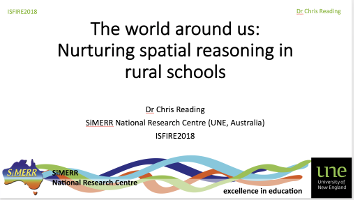The World Around Us: Nurturing Spatial Reasoning in Rural Schools
Chris Reading, University of New England, AU
Wednesday, August 1, 12:00-12:30, SUB Room 233, Theme: Students
The importance of spatial reasoning is becoming more widely recognised. Curricula around the world are including spatial reasoning more explicitly. Researchers are identifying, in particular, that young learners demonstrate informal spatial reasoning, that spatial reasoning can be developed through learning, and that there is a link between spatial reasoning and mathematical ability.
The investigation described in this presentation aimed to find out what rural schools are doing to nurture spatial reasoning and how successful this has been. Rather than initiate new data collection for this investigation, the researcher relied on projects already implemented that had been reported publicly. Analysis of these on-going or completed projects, related to spatial reasoning and mathematics, was undertaken to determine internationally what is being done and what works best.
A variety of projects implemented in rural spaces in different countries were identified. Interestingly, many of these projects involve Indigenous students. When projects focusing on spatial reasoning have incorporated connection with the local community, and acknowledged the importance of culturally-based and space-based mathematics learning there have been gains in mathematical engagement and ability.
The findings have the potential to encourage teachers to: change approaches to assessing students who are beginning school; plan activities that nurture pre-existing spatial reasoning; and connect the learning of spatial reasoning to fundamental mathematical concepts. Above all, those living in rural communities need to recognise the importance of spatial reasoning and how it contributes to every-day life in that community.
Presentation materials for download if you wish:
Click an image to download the document. This file may download immediately, or may require clicking on an additional button to download, depending on your browser.

